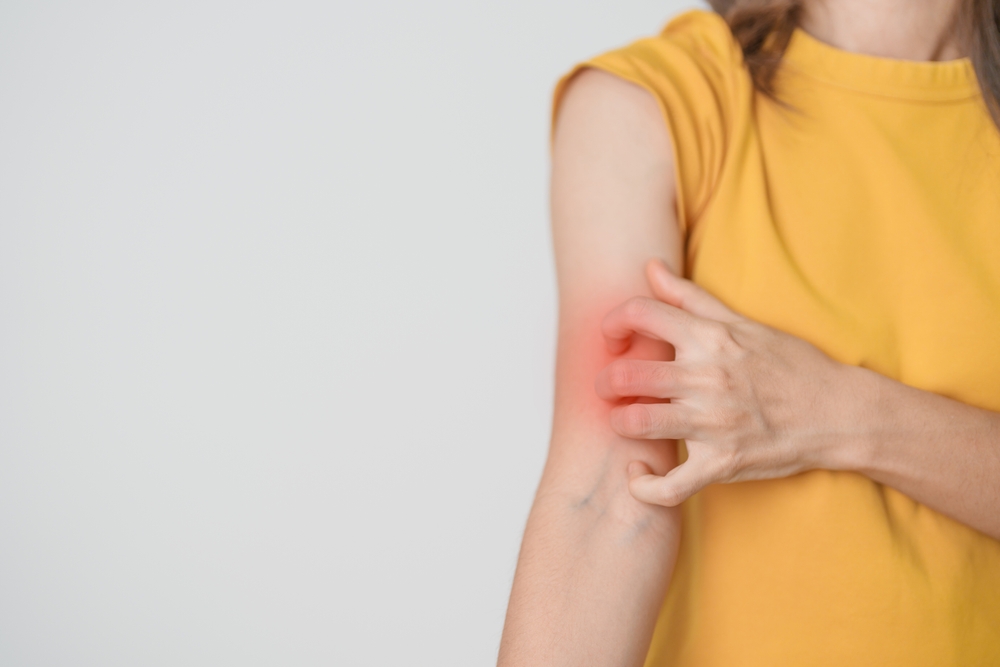

Itchy Skin – Causes, Diagnosis, and Treatment at Emirates Hospitals Group
Itchy skin, also known as pruritus, is a common condition that can cause discomfort and disrupt daily life. It can occur due to a variety of factors, and understanding the root cause is essential for effective treatment.
Causes of Itchy Skin
Several factors can trigger itching, including:
- Dry Skin: One of the most common causes, especially in cold weather, dehydration, or excessive bathing, leading to skin dryness and irritation.
- Allergic Reactions: Allergies to foods, medications, or skin care products can cause itching, along with other symptoms like redness and hives.
- Skin Conditions: Eczema (atopic dermatitis), psoriasis, and hives (urticaria) are chronic conditions that often cause persistent itching.
- Infections: Fungal, bacterial, or viral infections, such as athlete’s foot, scabies, or chickenpox, can lead to intense itching.
- Insect Bites: Mosquito, flea, or bedbug bites can result in localized itching and irritation.
- Systemic Conditions: Conditions like liver disease, kidney failure, and thyroid imbalances can lead to widespread itching across the body.
- Medications: Certain medications, including antibiotics, painkillers, and opioids, can cause itching as a side effect.
- Environmental Irritants: Exposure to chemicals, perfumes, or harsh soaps can irritate the skin, leading to itching.
- Nervous System Disorders: Nerve-related issues, such as neuropathy or multiple sclerosis, may cause unexplained itching in specific areas.
Diagnosis of Itchy Skin
A thorough evaluation is necessary to identify the cause of itchy skin. Diagnostic steps may include:
- Physical Examination: A close look at the skin and the affected areas helps in diagnosing common skin conditions and identifying possible triggers.
- Medical History: Discussion of any underlying health conditions, medications, allergies, and lifestyle factors that may contribute to the itching.
- Blood Tests: Blood tests may be required to assess for systemic conditions, infections, or allergens that could be causing itching.
- Skin Biopsy: In rare cases, a biopsy of the affected area may be performed to diagnose skin diseases or rule out certain conditions.
- Patch Testing: Used to identify allergies to specific substances, this test involves applying potential allergens to the skin to see if a reaction occurs.
Itchy Skin Treatments in Dubai
At Emirates Hospitals Group, our dermatology specialists provide personalized treatment plans for itchy skin, ensuring you receive the most effective care tailored to your needs. Treatment for itchy skin depends on its underlying cause and severity. Common treatments include:
- Moisturizers: Regular use of moisturizing lotions or ointments can help relieve dryness and prevent further irritation, especially for conditions like eczema and psoriasis.
- Topical Steroids: Steroid creams or ointments can reduce inflammation and soothe itching in conditions like eczema or allergic reactions.
- Antihistamines: Oral or topical antihistamines can be effective for itching caused by allergies or insect bites.
- Cold Compresses: Applying a cold compress can provide immediate relief from itching, especially in cases of heat rash or insect bites.
- Antifungal or Antibiotic Creams: If an infection is the cause, topical or oral antifungals or antibiotics may be prescribed to treat the underlying condition.
- Phototherapy: For chronic conditions like psoriasis, light therapy may be used to reduce inflammation and relieve itching.
- Systemic Treatments: In cases of systemic diseases, medications such as corticosteroids or immunosuppressants may be needed to control itching.
- Lifestyle Modifications: Avoiding known irritants, using gentle skin care products, and maintaining a regular moisturizing routine can help prevent flare-ups.
Related Treatments
Request an appointment
Please complete the details and we will book you shortly.
